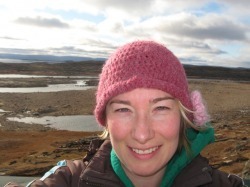Blue Box Seminar Series: Rachel Hirsch

This week's Blue Box Seminar will be presented by Dr. Rachel Hirsch, a postdoctoral fellow at the Labrador Institute. She will be discussing "Building connections for community resiliency: Working together to implement and evaluate a youth-hunter mentoring program in Nain, Nunatsiavut" on Friday, March 8 at 3 p.m. in SN 2025. The abstract is below.
For more information about Rachel and her research, you can visit the profile that appeared on the Geography site last year.
Abstract:
"Aullak, sangilivallianginnatuk" (Going off, Growing Strong) is a unique, culturally appropriate pilot program being led by the Nunatsiavut Government and the Community of Nain. It was launched in March 2012 in response to community demand for intergenerational transmission of harvesting skills, in recognition of the exceptional mental health benefits of land-based activities for youth at risk, and in response to the reported challenges in accessibility to wild foods due to climate and environmental variability and change. It builds upon the successful operation of a community freezer program in Nain and the first cohort of youth will complete the program in June 2013. This action and outcome-oriented project focuses on the implementation of a youth harvesting pilot project to enhance the long-term availability of wild foods through the freezer program by training the next generation of harvesters while addressing mental health and wellness issues among youth at risk. To date, youth activities have included activities such as large and small trips with experienced hunters, wild food cooking and movie nights, and the distribution of wild foods to elders. We are monitoring the success or 'impact' of the pilot program through: stakeholder engagement, formal outcome assessment, and rigorous documentation and tracking of program activities. Preliminary indicators of success include: enhanced navigational skills (weather change and safety), bonding with hunters and elders (helping shoot partridges, delivering country foods), reinforcement of current skills (fishing, gutting a seal, shooting a gun), introduction of new skills (shooting a gun, long-distance travel, building a smoke house), and provision of new experiences (seeing a polar bear, shooting and eating partridge)."